Related Research Articles
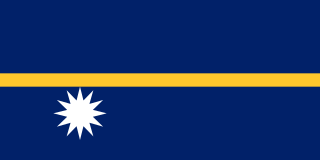
Nauru, officially the Republic of Nauru and formerly known as Pleasant Island, is an island country and microstate in Micronesia, part of Oceania in the Central Pacific. Its nearest neighbour is Banaba of Kiribati, about 300 km (190 mi) to the east.

The history of human activity in Nauru, an island country in the Pacific Ocean, began roughly 3,000 years ago when clans settled the island.

The politics of Nauru take place in a framework of a parliamentary representative democratic republic, whereby the President of Nauru is the head of government of the executive branch. Legislative power is vested in both the government and the parliament. The Judiciary is independent of the executive and the legislature.
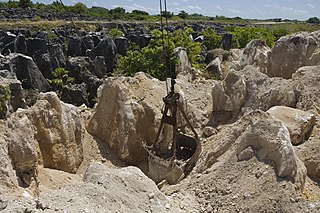
The economy of Nauru is tiny, based on a population in 2019 of only 11,550 people. The economy has historically been based on phosphate mining. With primary phosphate reserves exhausted by the end of the 2010s, Nauru has sought to diversify its sources of income. In 2020, Nauru's main sources of income were the sale of fishing rights in Nauru's territorial waters, and revenue from the Regional Processing Centre.

Denigomodu is a district in the western part of the island of Nauru. It is the most populous district in Nauru.
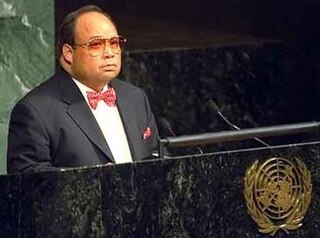
René Reynaldo Harris was President of the Republic of Nauru four times between 1999 and 2004. He was a Member of Parliament from 1977 to 2008.

Nauru First is the only formal political party in Nauru.

Marcus Ajemada Stephen is a Nauruan politician and former sportsperson who previously was a member of the Cabinet of Nauru, and who served as President of Nauru from December 2007 to November 2011. The son of Nauruan parliamentarian Lawrence Stephen, Stephen was educated at St Bedes College and RMIT University in Victoria, Australia. Initially playing Australian rules football, he opted to pursue the sport of weightlifting, in which he represented Nauru at the Summer Olympics and Commonwealth Games between 1990 and 2002, winning seven Commonwealth gold medals.

The following outline is provided as an overview of and topical guide to Nauru:

Foreign relations exist between Australia and Nauru. Australia administered Nauru as a dependent territory from 1914 to 1968 and has remained one of Nauru's foremost economic and aid partners thereafter. Nauru has a High Commission in Canberra and a consulate-general in Brisbane. Australia is one of only two countries to have a High Commission in Nauru. Both countries are members of the Commonwealth of Nations.

Nauruan nationality law is regulated by the 1968 Constitution of Nauru, as amended; the Naoero Citizenship Act of 2017, and its revisions; custom; and international agreements entered into by the Nauruan government. These laws determine who is, or is eligible to be, a national of Nauru. The legal means to acquire nationality, formal membership in a nation, differ from the domestic relationship of rights and obligations between a national and the nation, known as citizenship. Nauruan nationality is typically obtained either on the principle of jus soli, i.e. by birth in the Nauru or under the rules of jus sanguinis, i.e. by birth to parents with Nauruan nationality. It can be granted to persons with an affiliation to the country who has lived in the country for a given period of time through naturalization.

Christianity is the largest religion in Nauru, with Nauru Congregational Church being the largest denomination, encompassing 35.71% of the population as of the 2011 census.
The Nauru Phosphate Royalties Trust (NPRT) was a sovereign wealth fund developed by the government of the Republic of Nauru in which the government invested money from the state-owned mining company, Nauru Phosphate Corporation. This money was then re-invested in a real estate portfolio, among other things, to provide the government with a reliable national income following the depletion of minable phosphates on the island. Although at one time successful, mismanagement and corruption later essentially bankrupted the fund, thus virtually bankrupting the entire Republic.
Topics related to Nauru include:

The economy of Banaba and Nauru has been almost wholly dependent on phosphate, which has led to environmental disaster on these islands, with 80% of the islands’ surface having been strip-mined. The phosphate deposits were virtually exhausted by 2000, although some small-scale mining is still in progress on Nauru. Mining ended on Banaba in 1979.

India–Nauru relations are the international relations that exist between India and Nauru. These have been established since the island's independence in 1968.
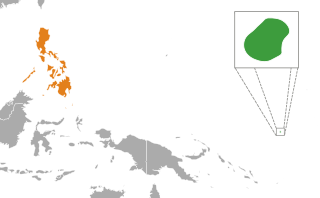
Nauru–Philippines relations are the bilateral relations between Nauru and Philippines. The Philippines maintains relations with Nauru through its embassy in Canberra, Australia
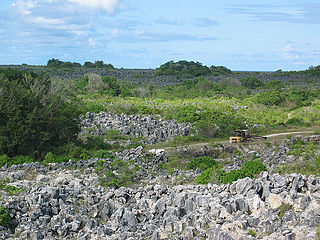
The Nauru Rehabilitation Corporation is a state-owned enterprise established by the Republic of Nauru in May 1999, following the passing of the Nauru Rehabilitation Corporation Act in July 1997. Its primary mission is to rehabilitate land destroyed by the phosphate industry, both before and after its independence, making them once again economically useful to the small island-nation.

The Church of Jesus Christ of Latter-day Saints in Nauru refers to the Church of Jesus Christ of Latter-day Saints and its members in Nauru. A branch was organized in 1984 with 16 members. It now has 133 members.
References
- ↑ "Nauru to build new home for president". RNZ. 22 September 2017. Retrieved 1 February 2024.